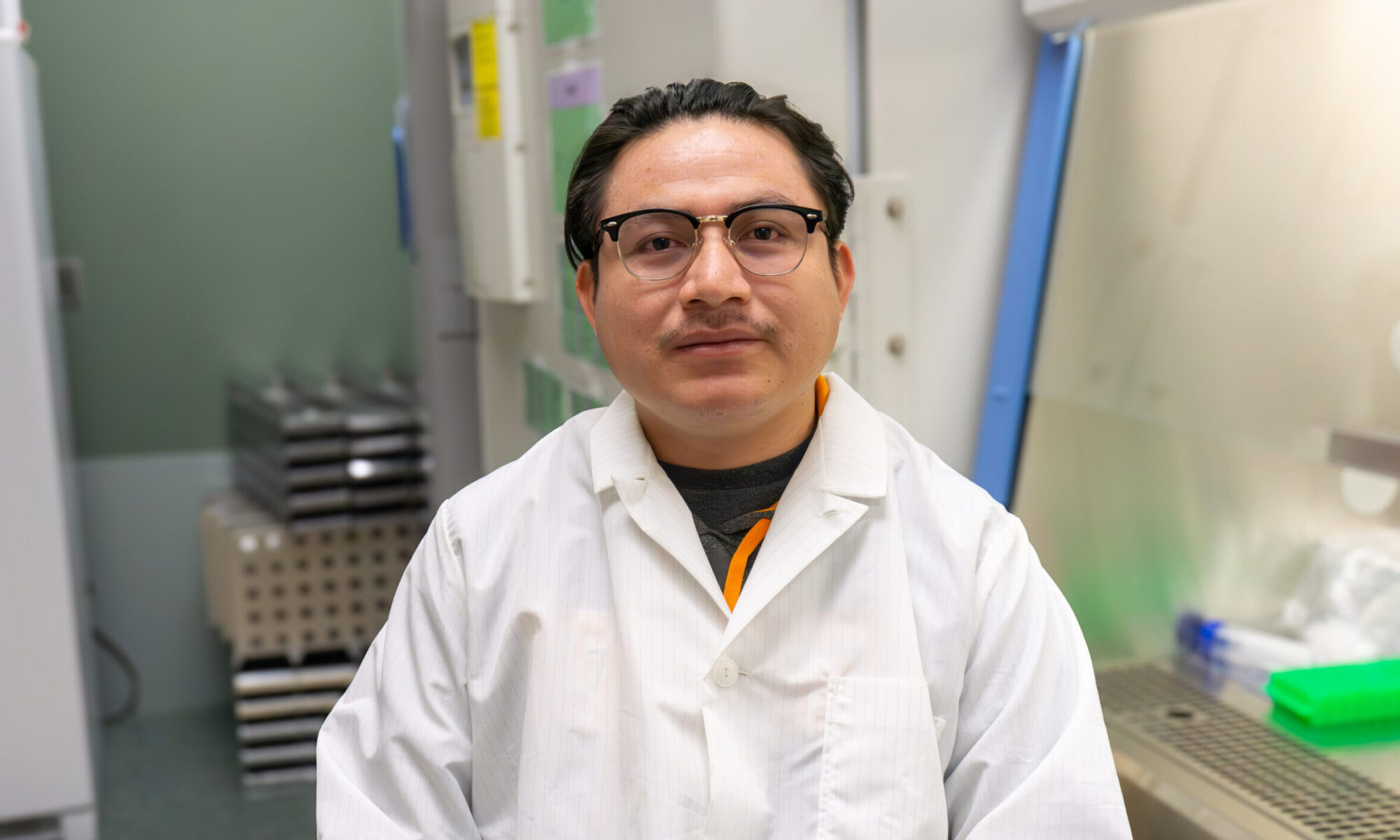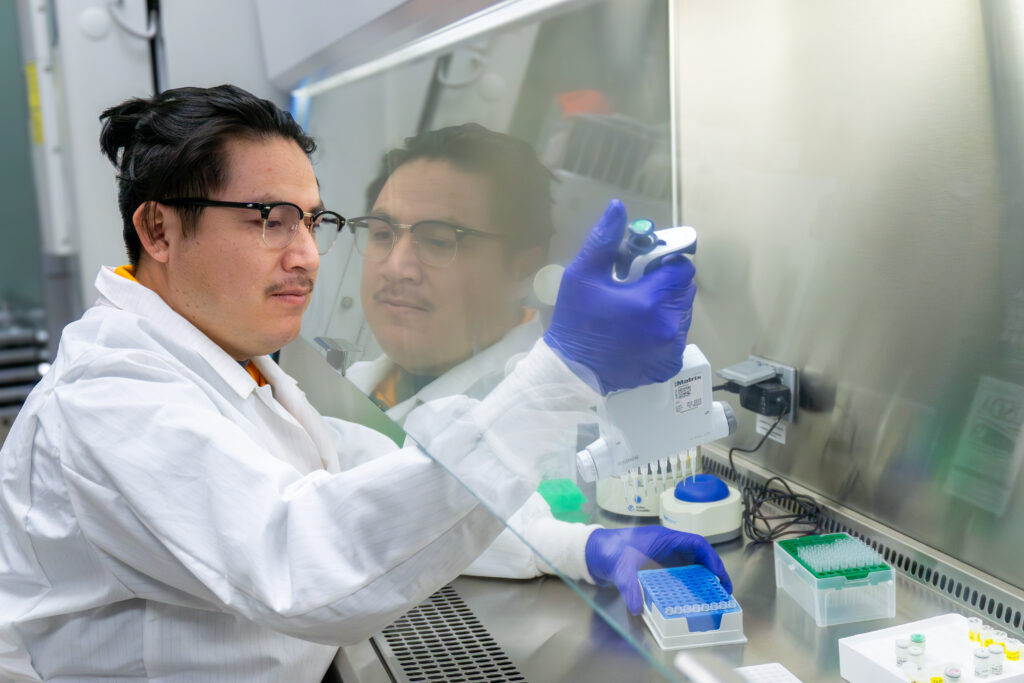
Lenardo Ash, a native of Belize, grew up in a rural community with a strong connection to nature. After earning a bachelor’s degree in natural resources management from the University of Belize and becoming a first-generation college student, Ash joined the Department of Entomology and Plant Pathology to pursue a master’s in plant pathology. His research focuses on endophytes—fungi that live inside plant tissues—found in Criollo cacao leaves. By studying the fungi and their roles in overall tree health using different bioinformatics tools, he hopes to support sustainable cacao production.
Q&A with Lenardo Ash
Can you tell us a little bit about yourself?
I am from Belize, a small but vibrant country in Central America with a population of just over 400,000. Growing up in a rural community allowed me to develop a deep connection with nature, while the strong sense of community made neighbors feel like family. I earned my Bachelor of Science degree in Natural Resources Management from the University of Belize, becoming a first-generation college student in my family. Currently, I am pursuing my master’s degree under the supervision of Drs. Denita Hadziabdic and DeWayne Shoemaker.
What is your current concentration, and why did you choose this field of study?
I am currently specializing in plant pathology, with a particular focus on diseases affecting cacao (Theobroma cacao L.). Before beginning my studies at UTK, I was deeply concerned by the losses I experienced with grafted cacao in a nursery due to pest and pathogens. Witnessing firsthand the challenges that farmers in Belize face due to pests and diseases further motivated me to take action and contribute to solutions in this field.
What is your current research question?
I am conducting a baseline study on the relative abundance and diversity of endophytes harbored in Criollo cacao leaves. We collected leaf samples in Belize during both the wet and dry seasons, extracted DNA, and now we are learning more about fungi and their roles in overall tree health using different bioinformatics tools.

Can you tell us more about your research?
The genetic group I am studying is an heirloom variety fine flavor but high susceptibility to disease. Despite this, it holds significant economic value, price can fetch up to five times the trade price of bulk cacao. As global efforts shift toward climate adaptation and mitigation, cacao, naturally an understory crop, is being increasingly incorporated into agroforestry systems across many cacao-growing regions. Preserving cacao genetic diversity is essential for breeding programs focused on improving quality and enhancing disease resistance, ensuring the sustainability of this valuable crop.
What impact does your research question have?
Cacao is the third most traded commodity by volume, following sugar and coffee, and serves as a primary source of livelihood for over six million people worldwide. With the growing demand for chocolate, identifying potential pathogens and developing effective control strategies is essential to sustaining cacao production and protecting the industry’s future
What challenges have you faced in answering your research question?
One of the main challenges was the inability to culture potential biotrophs (fungi that can’t be cultured in the lab).
What academic course has been your favorite and why?
Last semester, I took a Mycology course with Dr. Ownley, and I really enjoyed the topics covered. This class deepened my appreciation for the contributions of fungi and related eukaryotic organisms. However, I also recognized the significant impact of fungal and related species that cause diseases in economically important crops. Understanding the life cycles of both beneficial and harmful species is invaluable for plant pathologists.
How has your academic training in the department prepared you for your future career?
I have found my courses to be incredibly valuable, ranging from insect identification to seminar presentations. This program is equipping me with the knowledge and skills necessary to become a professional in the field.
What has been the highlight of your graduate school experiences so far?
The most significant aspect of my graduate experience has been adapting to a fast-paced environment where planning occurs months in advance. This journey has strengthened my independence while also teaching me the importance of time management. I have had the opportunity to connect with many supportive individuals at the university, which has made the adaptation process much smoother.
Are you involved in any extracurricular activities?
I am currently a member of the Gamma Sigma Delta chapter of Knoxville.
What are your favorite things to do on campus?
I like interacting with students and faculty.
What are your favorite hobbies?
When I was in Belize, I used to go birding a lot. Over the winter break, I got myself a binocular. So, hopefully, I can go birding again after the winter season
Any advice you would like to share with a prospective student?
A key advice for any prospective student is to seek clarification whenever something is unclear, especially when doing a large project and feeling stuck. Prioritize steady progress over attempting to accomplish everything at once.
Is there anything you would like to add?
One thing that stands out about my experience is the strong sense of collaboration within the department. Whether it’s working on research projects, discussions in lab meetings, or having spontaneous interactions with peers, I’ve always felt that learning here is a shared experience.
